To mark Disability Pride Month, members of our Authors with Disabilities and Chronic Illnesses (ADCI) network share snapshots of their workspace and their experiences as an author.
This is part of our #ADCIWeek activities, a week-long celebration of authors with disabilities and chronic illnesses.
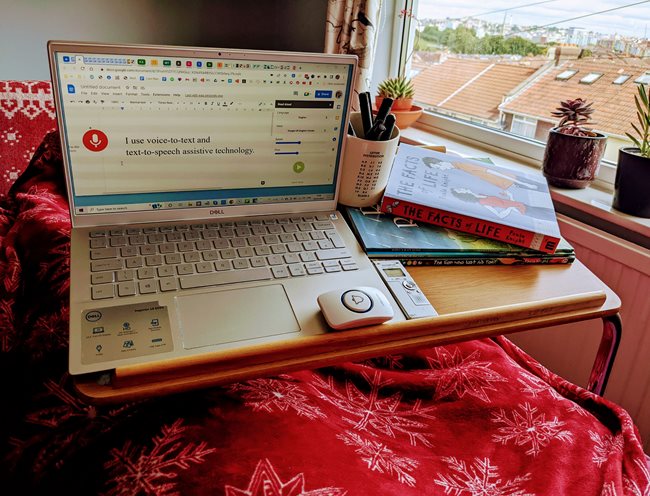
Paula Knight / @PaulaJKStudio
Around the time my last book was published, (The Facts of Life, Myriad 2017), I became disabled.
As a former illustrator and comics creator, eventually I became unable to draw. I'm now completely bedridden as a result of several chronic conditions which involve severe energy impairment. I had to explore new mediums and ways to continue writing.
Book publicity and events were a huge challenge in a pre-pandemic world. I did some events by making video talks and dialling in for Q&As, and my editor, Corinne Pearlman, presented talks that I’d written on my behalf. It's essential that the industry continues to provide hybrid events for both presentation and attendance. It makes all the difference to visibility and diversity; and it means that I can take part from bed.
However, it's important to note that with energy impairment disabilities, and fluctuating conditions, it can be the case that no amount of reasonable adjustments and technology can help. In this eventuality, it’s important that the author and their books are represented in their absence, especially if events are in-venue only.
Energy impairment is the main challenge to writing: I write when I can.
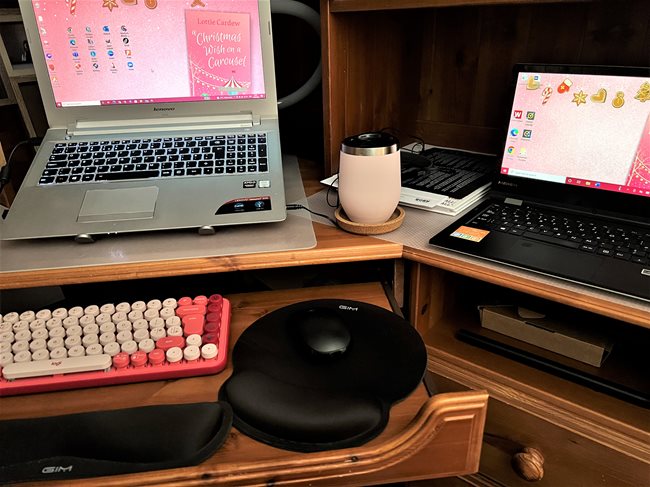
Lottie Cardew / @BossyNovelista
Welcome to my safe space, where I can unmask as I write. I’m neurodivergent (autistic and ADHD) and the ‘real world’ is an exhausting place to navigate: mentally, physically, emotionally. It’s even worse now with menopause colliding with the strains of family life. But even as a small child, confused and undiagnosed, fiction was my sanctuary.
And now it’s my privilege to be writing romantic comedies featuring neurodivergent, disabled, and chronically ill characters as part of a wider diverse cast, proving it’s more than possible to reflect society while still being entertaining and uplifting and providing a much-needed form of escapism.
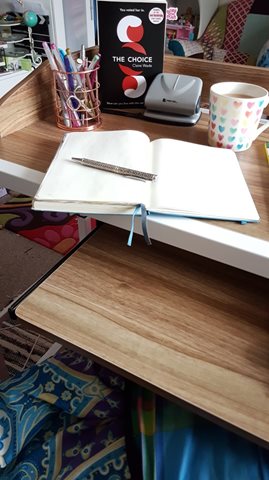
Claire Wade / @ClaireRWade
Being disabled has made me find alternative ways to do the things I want to. I’ve had to learn to adapt and this includes my writing, both how and where I write.
When I wrote my debut The Choice I was able to sit on the sofa with my laptop and type 1500 words a day, since my relapse I’m now writing from my bed, using a pen and paper or dictation software, and that’s only on days I’m well enough.
My progress is slow, my energy and concentration levels are very limited and it’s incredibly frustrating but even slow progress is still progress, and I experience so much joy - it’s worth it.
I write to escape, to discover a world beyond my own and it feeds into my stories. My characters want to escape the constraints of their lives too and by helping them I help myself. I might still be writing from my bed but in my imagination I’m free.
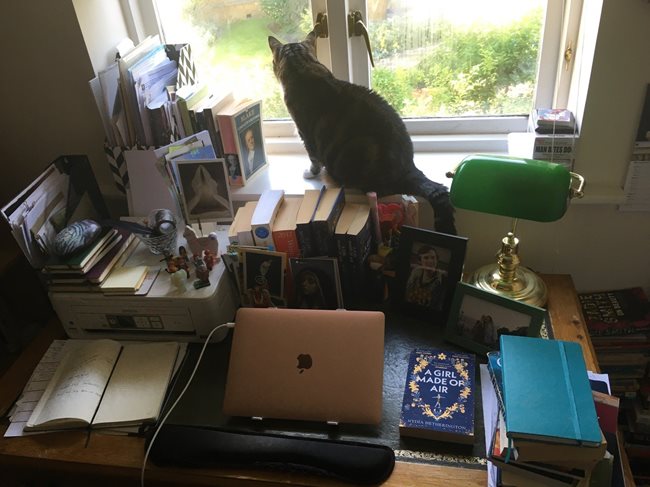
Nydia Hetherington / @NydiaMadeOfAir
My writing evolved as it became increasingly difficult for me to continue to work in theatre. I trained in physical theatre and for many years created devised non-text based work.
The pain and fatigue of Rheumatoid Arthritis (an autoimmune disease) drove me to the page and it's the one (and only one) thing I'm grateful to it for. Finding it has been a blessing, but it’s not without its physical difficulties.
I can’t sit at my desk for long periods of time as the pain gets overwhelming. I also suffer from extreme fatigue, so I can only work productively in the mornings, except for on my ‘meds hangover’ days. This is at least once, but sometimes twice or thrice a week.
The medication suppresses my immune system and is the reason that I was shielding for over two years.
I am now starting to assess and manage risk, but I’m also hoping that festivals and literary events across the board will systematically adopt a more hybrid way of working, so that the many authors who cannot attend in-person events due to disability and chronic illness are not automatically excluded.
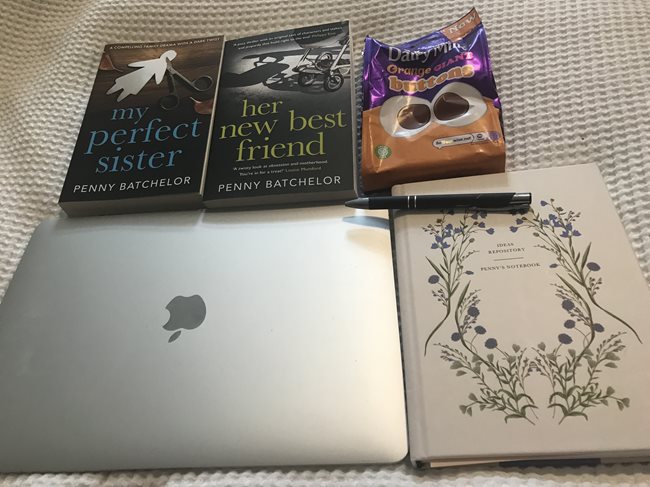
Penny Batchelor / @PennyBatchelorAuthor
I write in bed as it's the most comfortable place for me to write due to my chronic pain and fatigue. I don't have a set routine. For me, energy can be a barrier to writing and therefore I write when I find I'm able to, whatever the time of day or night!
I'm campaigning for the publishing industry to #KeepFestivalsHybrid, to ensure that disabled and chronically ill authors can appear at author events and literary festivals online and not miss out.
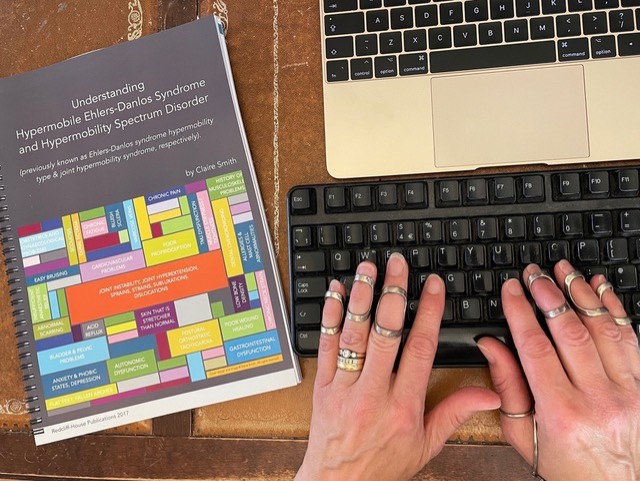
Claire Smith / @understanding_heds
Above is me at work with my author tools - silver ring splints to prevent hypermobile finger joints from dislocating and a second keyboard for eye-height monitor (to keep neck joints aligned).
I write so that people affected by hypermobile Ehlers-Danlos syndrome and hypermobility spectrum disorder, and those providing their care, have accessible, unbiased, evidence-based answers to their questions and concerns.
I do my best to communicate the content in a clear and concise manner, where possible avoiding the use of unnecessary technical medical jargon that can be incomprehensible to many outside the medical profession. My aim is to leave readers better informed and more able to navigate their way through the complexities of these conditions and their management.
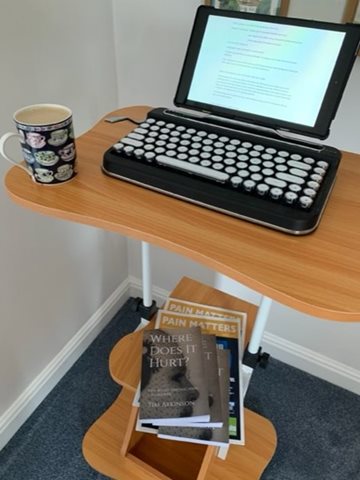
Tim Atkinson / @dotterel
I've suffered from inflammatory arthritis for nearly 30 years, which has robbed me of the energy and the ability to enjoy what should have been the best years of my adult life.
I work standing in an upright desk like this because I've been sitting for large periods of time very uncomfortable.
But I've recently learned an awful lot about patient self management as far as my condition and the pain that it causes is concerned and a couple of years ago, I wrote a memoir about my experience called Where Does It Hurt?.
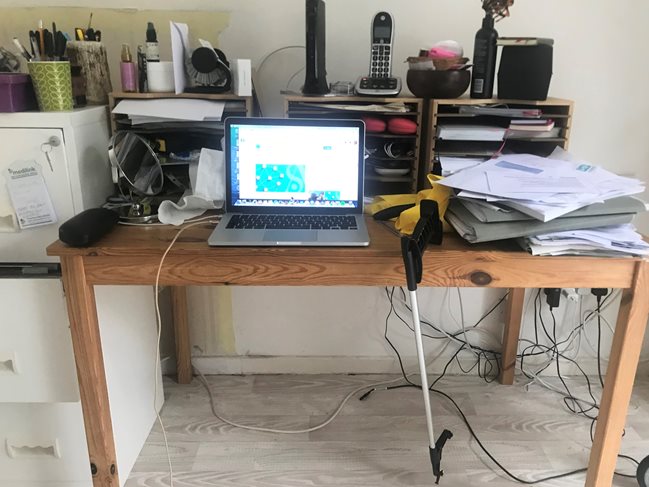
Sarah Myers
I write to understand and to record the words that pop up in my head.
I write in chaos. But is it the chaos that’s creative or am I creative because I am chaotic? I write by hand which keeps my increasingly stiff muscles moving.
So why don’t/can’t I go to events? It’s a nice idea but not currently a business model that works for me: why am I going to pay to be excluded?
Brochures show beautiful photographs of dining rooms with sparkling cutlery and glass laden tables without wheelchair spaces between them. If that’s the case imagine what the toilets are going to be like? It’s about time to shift the old marketing patterns and deliver a bit more honesty about venues and events. Here’s some suggestions:
- Choreograph and route manage the event better and tell us exactly what isn’t on offer.
- Let us know how inaccessible this particular event/venue is – who can really access all of it?
- Check that there are disabled access rooms/bathrooms – really accessible!
- Highlight what won’t work for everybody, and why.
- Promote energy sapping audits – ours not the electricity!
More ambulant colleagues may then also start demanding somewhere suitable for everyone. I repeat - why pay to be excluded? Angry, aren’t I? So should you be.
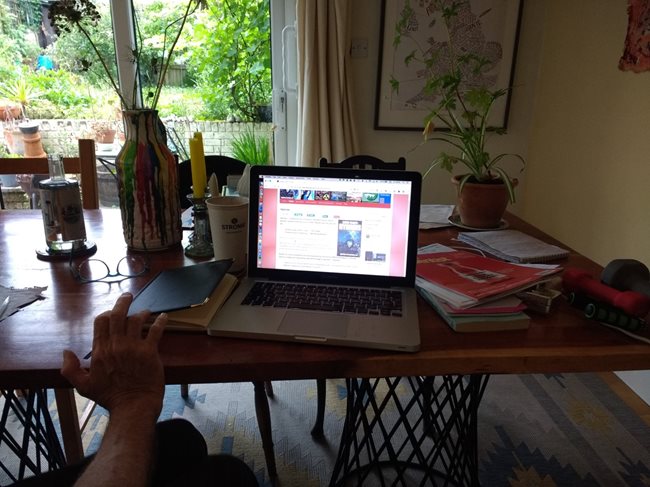
David Thorpe
I write because it gives meaning to my life. If I didn't write I would get terribly bored. I like writing for young adults because they have enquiring minds. They are much more interesting and demanding than grown-ups. In my mind I am still a teenager myself. I love having my mind boggled so I try to boggle people's minds with my writing.
As a disabled person the biggest obstacle I have faced in the publishing industry is to admit to the full implications of my disability. I am still dealing with that one because it involves facing up to them myself. It would help if the industry reached out more.
Twitter: @DavidKThorpe
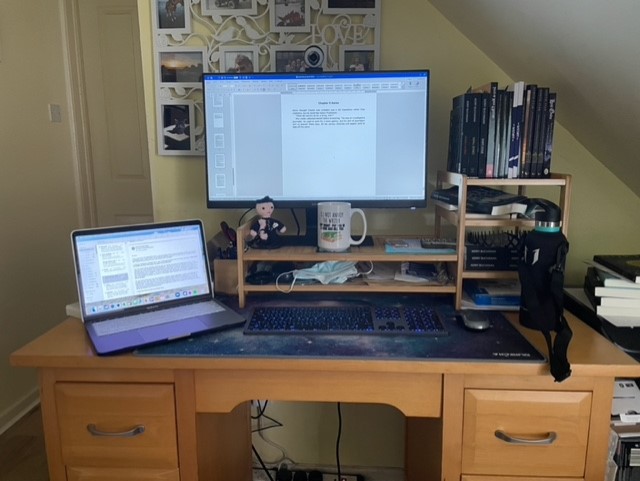
Kerry Buchanan @DabblingInCrime
I've been writing now for about eight years, although it feels like only a few months. I began at an embarrassingly low level of ability but have worked hard to improve my skills and now I'm a successful author with a crime series published by Joffe Books.
It has been difficult at times because I suffer from psoriatic arthritis, ME and fibromyalgia, all of which affect my ability to type and my energy levels and mood.
I've made a number of alterations to my writing process to compensate: I can no longer handwrite so I have to type (slowly and clumsily), and I had to acquire a separate keyboard and a raised monitor to reduce irritation to wrists and neck.
Despite these limitations, I've been very lucky. My publishers have been incredibly supportive and understanding, and I still manage to churn out a couple of novels a year. I've learned that if I'm having a bad flare there's no point in trying to force the writing, so now I just walk (hobble!) away and try not to worry about it until the pain and/or exhaustion go away again.
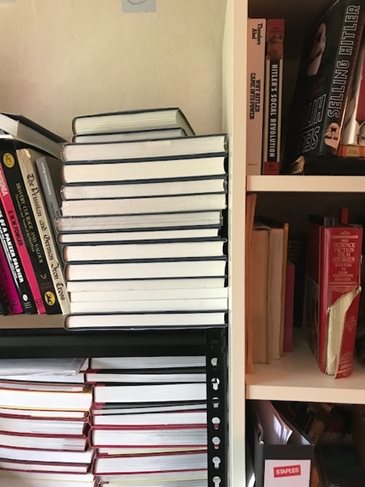
Michael Hughes / @HDrMichael
I lost my sight in 1998. Routledge has published my nonfiction book in the area of the Second World War’s material culture and collecting military artefacts.
I am now writing a fiction novel and am usually up all night and sleeping all day.
It is a double blind/author thing.
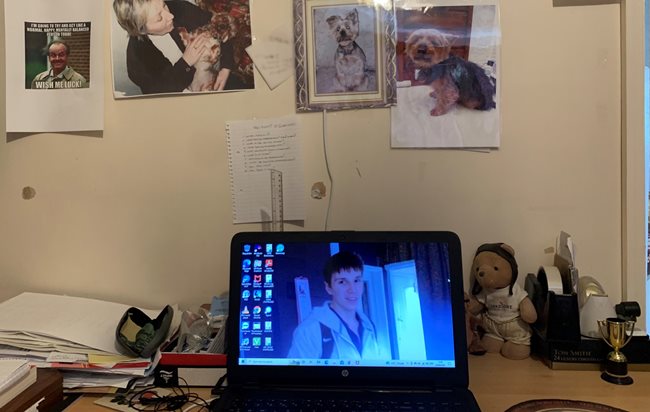
Bryn Peterson
Another Arbor is my antidote to a devastating diagnosis. I didn’t (and still don’t) want to think about it. I just wrote and the result is a gritty, crime thriller, my challenge to the crime thriller story ethos. I wanted to show villains are more than bad people. I wanted to show a background cause for nastiness.
I try to write most days. We have a home office and let my brain wander wherever imagination takes it. It helps to make my recovery a little more bearable.
Businesses today (and the Publishing world is no different) believe they are ‘inclusive’ when they have ‘mental health awareness’ days or similar. This might ‘tick a box’ but that doesn’t make it helpful.
Real support is doing something to really help. For example, my energy levels fluctuate wildly. I want to attend an event; travel is prohibitively difficult. I can’t be sure I’ll be fit enough to travel on the day.
Conversely, online events with a replay give the flexibility to watch/listen, or catch-up later. The publishing world needs to encourage ALL writers, regardless of their physical or mental wellbeing, with practical solutions, not ‘awareness’ days or a ‘caring’ emoji.
ADCI Network
Authors with Disabilities and Chronic Illnesses (ADCI) is open to Society of Authors members who self-identify as disabled. We have a Facebook group and a monthly Zoom meeting.